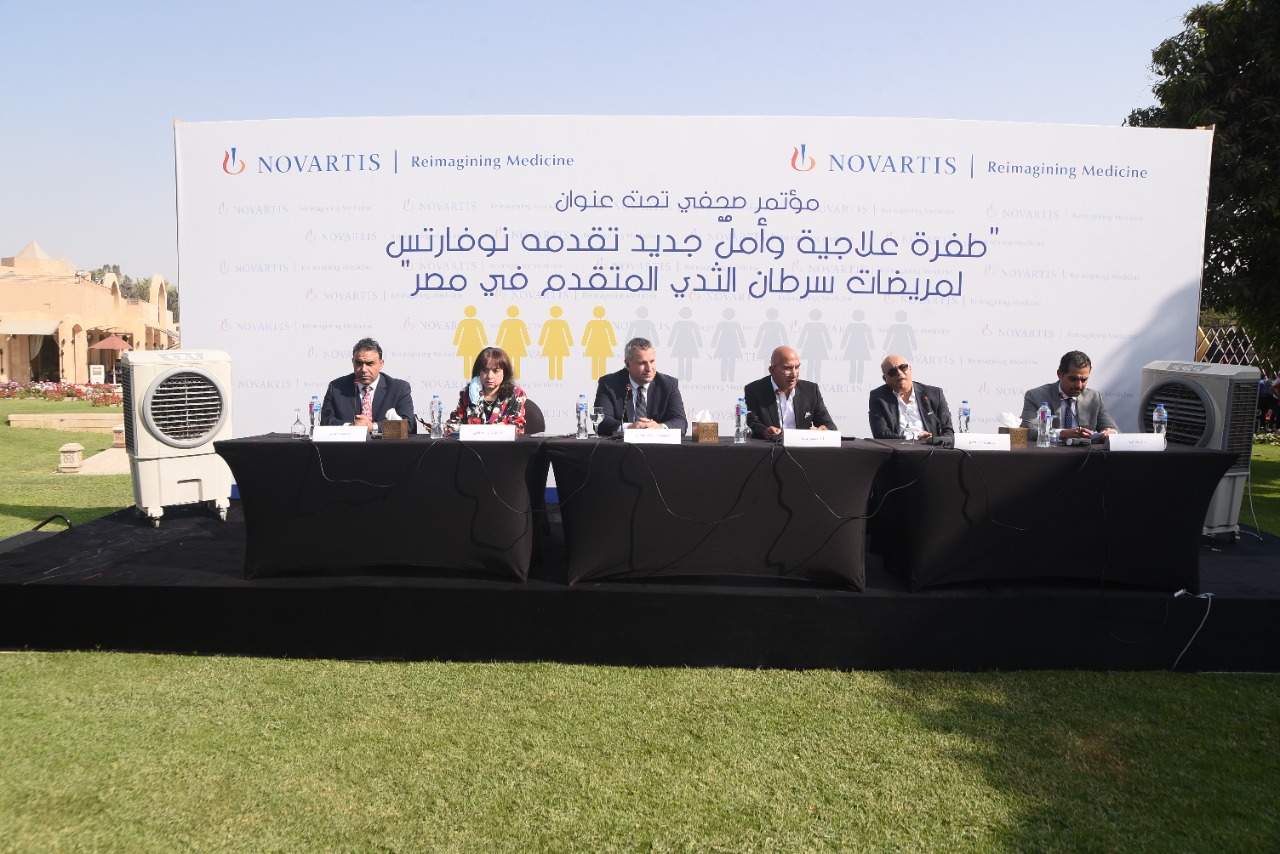Novartis Pharma (Novartis Egypt), announced the launch of the newly approved treatment for PIK3CA-mutated HR+ve Advanced Breast Cancer. The FDA approval of Alpelisib is based on the genomic profile of cancer, assessing a patient’s response to treatment by testing biomarkers of PIK3CA mutations and developing a treatment plan accordingly. Alpelisib is a major breakthrough in the treatment of advanced metastatic breast cancer, offering a new hope to improve the quality of life for Egyptian patients.
“Breast cancer is the most common form of cancer among Egyptian women, affecting up to 34% of women in the country. Approximately 20% of these breast cancer cases progress to the metastatic stage8. Metastatic breast cancer, or Phase IV breast cancer, is breast cancer that has spread beyond the breast to other parts of the body (such as the lungs, liver, bones or brain)9” said Prof. Hamdy Abdelazim of Clinical Oncology, Faculty of Medicine, Cairo University.
“Under the umbrella of the Egyptian Presidential Women’s Health Initiative, the Ministry of Health has introduced new treatment protocols for advanced breast cancer, making the best-in-class and most innovative medications available throughout Egypt. This is a transformative milestone in the treatment of advanced breast cancer especially over the past two years, and an old dream that has come true” he added.
“In our pursuit of transformative treatments, we strive to intervene earlier in chronic illnesses and find ways to dramatically improve quality of life. For over 30 years, addressing advanced breast cancer has been a priority for Novartis; while focusing on science and with a great collaborative spirit and passion aiming for transforming patient care. In addition to that, we own the largest number of breast cancer compounds in development in the industry, including the discovery of new therapies and combinations for HR+ advanced breast cancer – the most common cancer in Egypt,” explained Dr Sherif Amin, General Manager for Novartis Oncology Egypt, Morocco and Tunisia.”
“With minimal adverse reactions, the targeted therapies are by far more effective than conventional cancer therapies, as this new generation of innovative therapies specifically targets cancer cells with genetic mutations. PIK3CA mutations are the most prevalent genetic mutations in metastatic breast cancer, affecting 40% of the total breast cancer’s population4,5. These mutations impact tumour growth, the resistance to endocrine-based therapies, and the overall deterioration of a patient’s general condition 10,11. Alpelisib is the first treatment to target PIK3CA mutations while eliminating resistance to endocrine-based therapies for patients with HR+ metastatic breast cancer 6,7” Professor of Oncology, Director of the Kasr Al-Ainy Center for Oncology and President of the Egyptian Association for Supporting Cancer Patients “CanSurvive”, Mohsen Mokhtar, explained.
“Significant work has been done to explore treatments that target PIK3CA mutations and there is now a consensus amongst the scientific community that targeting this mutation may hold the key to halting the growth of metastatic breast cancer,” said Ibtessam Saad Eldin, Professor of Oncology, Faculty of Medicine, Kasr Al-Aini, Cairo University.
“FDA approval of the new treatment was based on phase III results of the clinical study SOLAR-1, which highlighted the potential for Alpelisib – in combination with fulvestrant – to nearly double Progression-Free Survival (PFS) compared to fulvestrant alone, for patients with advanced HR+/HER2- breast cancer with PIK3CA mutations. The Trial also demonstrated that the addition of Alpelisib demonstrated an additional 8 months of overall survival compared to Fulvestrant alone. For women with metastatic breast cancer that has spread to the lung and liver specifically, the study showed up to an additional 14 months of overall survival 6,12,13. These results show that this approach is expected to offer new treatment alternatives and new hope for a longer life for patients, whose tumour has shown resistance to endocrine-treatments and a mutation in the PIK3CA gene,” said Prof. Dejan Juric, Oncology Specialist at Massachusetts General Hospital.
“The ultimate objective of all types of advanced cancer treatments is to slow down disease progression and help manage it effectively while enabling patients to enjoy their regular daily life for the longest time possible. In recent years, the overall survival has increased significantly, giving women with advanced breast cancer new hope, particularly patients with PIK3CA mutations, who can now achieve more of their dreams. Women with breast cancer are mothers, wives, sisters, and working women. The new treatment gives them real hope in the possibility of finding an innovative solution, which would improve their quality of life and enable them to spend a longer time with their loved ones, instead of undergoing the intolerable sufferings of chemotherapy” said Dr Hisham Elghazaly, Professor of Oncology, Faculty of Medicine, Ain Shams University, and Head of the Ain Shams Medicine Research Center.



